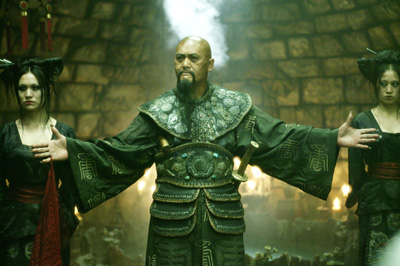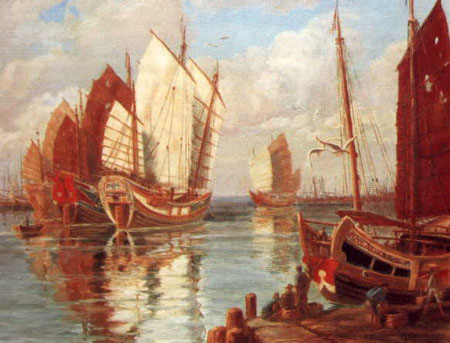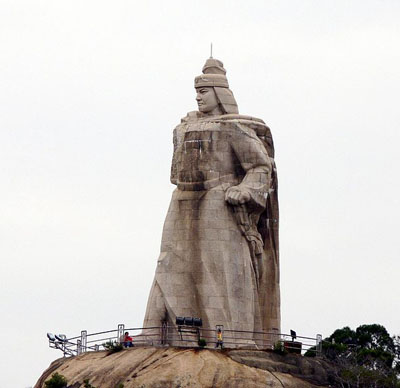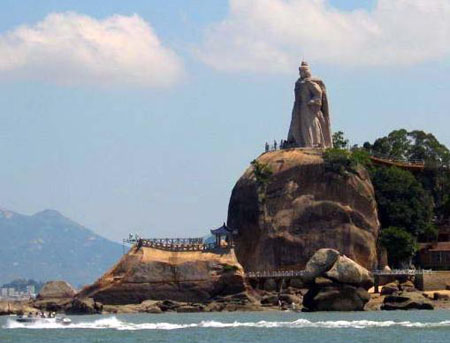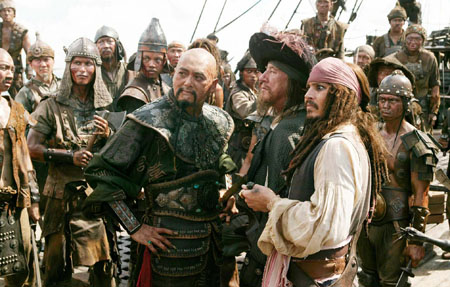I received the following question recently, and decided to devote a whole post to it:
You always choose interesting characters to be a part of your books and, of course, Zheng He is one of them. Am I correct in assuming that your Zheng He is THE Zheng He, the admiral and the reportedly Muslim eunuch who travelled a lot for his Chinese dynasty? If that is so, should I break hundreds of hearts and imaginations who are coupling Zheng He with Dory by saying that he was a eunuch? Or are you going to change some of these reported characteristics of his?
This is a fun question! Mainly because it lets me talk about pirates, and I love me some pirates. Especially Chinese pirates. So sit back and buckle in; we’re going to be here a while!
First, in answer to your question, Zheng He (also known as Cheng-Ho, the famous 15th century Ming Dynasty admiral) and my Zheng-zi are not the same person. Zheng is a common name in southern China, and there were/are a lot of people named Zheng. Likewise, zi is an honorific, meaning honorable/wise. Confucius’s real name, for example, was actually Kong-Fu-Zi or “honorable master Kong,” before Western writers bastardized it. So there have also been a lot of “zi’s” in Chinese history. But my Zheng does have a colorful past, and since you asked . . .
My Zheng-zi is Zheng Zhilong (1604-1661), also known as Nicholas Iquan Gaspard. Here’s the wiki entry on him. Short version of his story: Zheng, the son of a mid-level Chinese bureaucrat, was run out of his father’s house as a teenager for making moves on his stepmother (so not a eunuch! In fact, he was rumored to have quite the libido, as well as being bisexual). After a time spent in Macao (where he acquired his Portuguese name) and Japan, he met a merchant named Li Dan and became his lover. On Li Dan’s death, he got his ships.
Li Dan only left him maybe twenty in all, but Zheng soon turned them into a sizeable pirate fleet by convincing the Dutch to give him extra ships and weapons so he could help them combat their trade rivals, the Portuguese. He used them instead to organize the Shibazhi, a cooperative effort of Chinese pirates. Which is a nice way of saying that he made himself the head of a freaking huge pirate fleet that went around plundering everything in sight, from his former allies the Dutch, to the Portuguese (because hey, he’d given his word), to the Ming Dynasty itself!
After his organization defeated the royal navy, he was made a count, a large landholder and an admiral by the Ming (because “if you can’t beat ’em, join ’em” is not a new concept). He promptly earned his title by continuing to plunder the heck out of the Europeans. It seemed the bad boy had finally come out on top.
But the good days didn’t last. He was executed by the Q’ing dynasty, the guys who kicked out the Ming, because his son had stayed loyal to the deposed dynasty and was causing the Qing a lot of trouble. That son, Zheng Chenggong, on hearing of his father’s death, then went on a tear with his fleet of eight hundred freaking ships, and caused them a lot more trouble! Here’s the statue to Zheng Chenggong in Fujian.
Fun fact: Zheng’s son became so famous that he was worshipped as a god in some parts of coastal China.
My take on all this, of course, is that Zheng-zi was rescued on the eve of his death by an enterprising pirate of the undead persuasion, who decided that he could use his knowledge of the seas. Eventually, his master acquired another servant, bringing Zheng into the orbit of a young, ambitious type known as Cheung Po-Sai. It would be a fateful meeting.
You may have heard of Cheung, my other famous pirate vamp, if you’ve ever visited Hong Kong. His name translates to “Cheung-Po the Kid” and he’s basically a Billy the Kid/Robin Hood type character in local lore. He’s also a popular figure in Hong Kong cinema, maybe because his history reads like a movie script already. The son of a poor fisherman, he rose to be the pirate king of an armada of six hundred ships while still a young man.
How did he manage this? He got his start by being kidnapped by a prominent pirate at the age of fifteen, sometime in the late 18th century. According to rumor, Cheung took to the life quickly, becoming a flamboyant, Captain Jack Sparrow type pirate and his kidnapper’s lover . . . and then adopted son! And, when his “father” died a few years later, Cheung promptly bedded his wife!
The wife, by the way, was interesting in her own right. Probably as much a leader of the pirate band they inherited as Cheung, she was also likely the reason he famously executed any of his men who hurt or raped the women they encountered on their raids. Her name was Ching Shih, and she started life even worse off than Cheung, as a prostitute in a small brothel in Canton. Until, that is, she was taken as plunder in—you guessed it—a pirate raid.
But to a girl whose family had likely sold her into prostitution (a common fate for unwanted girls) this didn’t seem so bad. Especially after she married a prominent pirate named Zheng Yi (see I told you—there’s lots of Zhengs! But no relation to mine). She thereafter helped her new husband put together a formidable alliance of pirate ships, known as the Red Flag Fleet, and was said to fight at his side in raids. Here’s a pic of her in battle:
After her husband was killed in a typhoon, she took up with his adopted son/lover Cheung Po-Sai. Together, the fisherman’s son and the prostitute became the holy terror of the South China Sea, especially enjoying plundering the heck out of the European forces there. Since they couldn’t defeat them, the British were eventually forced to offer amnesty, which Ching Shih accepted as she wasn’t getting any younger. In 1810, she retired to run a gambling house and smuggle opium (hey, a gal has to keep busy), while her young husband went on to brief respectability as a captain in the Qing navy.
You can read more about Ching Shih here.
The wiki article on Cheung isn’t very good, but you can see the cave where he used to store his loot below.
It’s a popular Hong Kong tourist destination these days.
In my version of the story, Cheung’s naval career ended in a fateful meeting with Zheng-zi’s master. As he had in life, Cheung scaled the ladder fast as a vampire, becoming a first-level master in less than a century (for comparison, Zheng-zi was still second-level at this point). He subsequently received an offer from Ming-De: if he and Zheng would work together to overthrow their master, who was causing Ming-De some trouble, she would see to it that they received “improved status.”
They took Ming-De’s promise to mean seats on the East Asian Court, the pinnacle for ambitious vamps. And since their master was cruel even by vampire pirate standards, this was enough to get them to turn on him. But when they proudly presented his severed head to Ming-De a few months later, they received only thanks and pardons for working as his assistants!
But, fast forward a century or so, and they finally received their coveted senate seats—on the North American Senate. Have they patched things up with Ming-de? Are they working as her agents, as the North American consul believes? Or are they still smarting from her little trick, and might be open to new alliances? Only time will tell.
Fun fact: Sao Feng of the “Brotherhood” in Pirates of the Caribbean: At World’s End is based on Cheung and “Lady Cheng” on his wife, Ching Shih.

